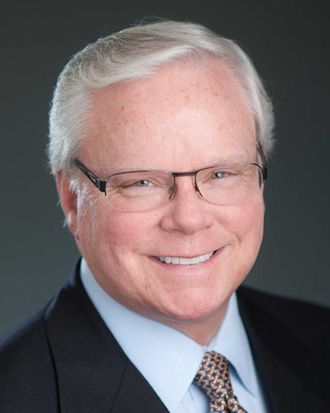
Ed Rogers is a Washington lobbyist, and, for reasons I have never been able to discern, a regular op-ed columnist for the Washington Post. Rogers may indeed be the worst op-ed columnist in America — certainly the worst one writing for a respectable publication.
Rogers’s published work suffers from a series of fatal deficiencies. First, as founding member of a lobbying firm with a wide-ranging portfolio and a presumably enormous income, literally everything he writes suffers from crippling conflicts of interest. Second, he is a terrible writer whose arguments lack any originality, persuasive power or, quite often, even facial plausibility. One of the unique trademarks of a Rogers column is outsourcing the work to other, better columnists (which is to say, virtually all of them). For instance:
As David Ignatius said this morning, “It’s strange that the Democrats who were so angry at [Comey] are now furious at his firing.”
Or:
Anyway, everyone should also carefully consider the arguments made by constitutional scholar Alan Dershowitz. Dershowitz presented some compelling legal insight. “The president,” he writes, “is the head of the unified executive branch of government, and the Justice Department and the FBI work under him and he may order them to do what he wishes.”
Or:
The Wall Street Journal notes that this bill includes “enormous conservative policy victories, even if they aren’t everything we or other free-marketers would like. Democrats built the entitlement state piecemeal over decades, and it will have to be reformed in pieces that are politically sustainable.”
Rogers’s most recent effort sets out to defend the Trump administration from accusations of campaign collusion with Russia. As usual, Rogers outsources his central thesis to another columnist:
As Harvard Law Professor Alan Dershowitz stated yesterday, “it is unlikely that attendance at the meeting violated any criminal statute.” Well said, Mr. Dershowitz.
Nobody is saying attendance at the meeting was ipso facto a crime, since we don’t know what happened at the meeting. It is ipso facto evidence of the campaign’s eagerness to cooperate with Russia’s influence operation, which did include illegal acts.
Rogers then pivots to arguing that Donald Trump Jr. is definitely telling the truth about the meeting:
And yet, the media would have you believe that the meeting Trump Jr. described as “literally just a wasted 20 minutes” is a smoking gun that will inevitably take President Trump, his administration and his entire family down forever.
Given that Trump has lied repeatedly about this subject, first denying having any contacts with Russians, and then misstating the premise of the meeting, is there a particular reason to assume his current account of what went on is necessarily correct?
Rogers proceeds to declare the emails exculpatory, without explaining why:
In reality, Trump Jr.’s emails show he has nothing to hide.
Rogers asserts this and then moves on. In reality, the emails almost certainly show that Trump had a phone call with Emin. In several emails, Trump Jr. and Goldstone set up a phone call in quick, rapidly returned messages, followed by a gap, then Trump thanking Goldstone for his assistance. (Goldstone: “Ok he’s on stage in Moscow but should be off within 20 Minutes so I am sure can call Rob.” Trump: “Rob thanks for the help.”) Did the phone call happen? Trump hasn’t said. That’s definitely one thing he is hiding.
Rogers proceeds with his assertions that obviously Trump Jr., after a series of lies, is now telling the truth:
I don’t think Trump Jr. went on national television last night and told a bunch of lies.
You hear that? He went on national television. It’s not like lying on local television. Being on national television is practically like being under oath. It would apparently be unheard of to lie in such a venue.
Rogers does concede that not everybody would agree:
Undoubtedly, the president’s enemies will believe that they are justified in feeling otherwise. But Trump Jr. has little incentive to do anything but tell the truth at this point.
He has no incentive to lie? What if he did something illegal or grossly unethical? Then admitting it would put him in a bad position. That seems like an incentive to lie, doesn’t it? And given his pattern of lying about this exact subject in the past, that incentive may be relevant.
If you ignore the central revelation of the emails, which is that they reveal Trump being receptive to Russian efforts to help his father’s campaign, and further ignore his pattern of omissions and lies before being cornered with the truth, and then further assume both that Trump is now telling the truth and that no other harmful news will emerge, then yes, he might be innocent. But why does the Post need to give a lobbyist op-ed space to make these assertions? Can’t they just cut and paste quotes from Trump himself?






























